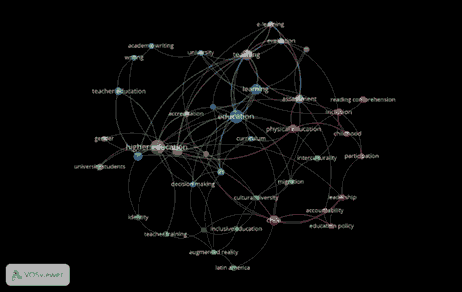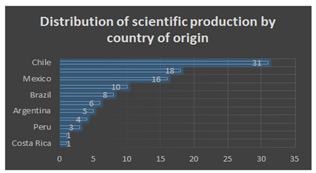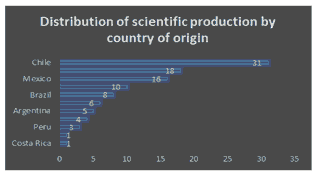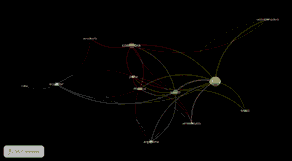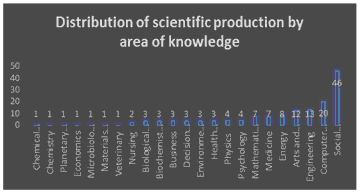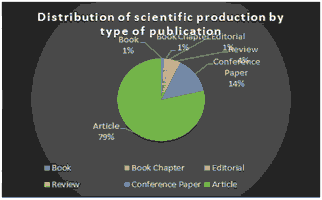Research Article: 2022 Vol: 21 Issue: 2S
Feedback Systems as Support for Decision Making Related to the Pedagogical Process in Educational Institutions: a Review
Estephany Abigail Rojas Torres, Universidad San Ignacio de Loyola
Patricia Medina Zuta, Universidad San Ignacio de Loyola
Yoselin Andrea Huapaya Capcha, Universidad Nacional Mayor de San Marcos
Bryam Alejandro Colán Hernández, Universidad Nacional Mayor de San Marcos
Fabrizio Del Carpio Delgado, Universidad Privada del Norte
Abstract
A documentary review was carried out on the Feedback Systems variable, focused on decision-making in pedagogical processes in educational institutions in Latin America during the period 2015-2020, through the identification of research works published in indexed high-impact journals in Scopus database. The study was carried out by applying certain search parameters that allowed the analysis of a total of 84 publications, which were organized according to their distribution by Year of Publication, Country of Origin, Area of Knowledge and Type of Publication. In this way, an analysis was done from a bibliometric perspective obtaining that, with 31 publications, Chile is the Latin American country with the highest number of records during the indicated period and that the years 2019 and 2020 equally record the highest number of publications, 20 during each one. The area of knowledge through which the largest registry of bibliographic contributions was reached was Social Sciences with 46 contributions. Once the information was organized through the necessary figures and tables, a bibliographic analysis was carried out taking into account some examples as contributions in the bibliography of some authors in each of the aspects studied, with the purpose of knowing their position about the proposed topic.
Keywords
Feedback Systems, Pedagogical Processes, Educational Management, Quality in Education
Introduction
Pedagogical processes have proven to have a very close relationship with the achievement of quality objectives in the academic training of students. These processes allow designing guides for developing strategies aimed at meeting the goals established in educational management, not only in terms of curricular content but also in terms of quality perceived by the different interest groups (Scribe, 2018). This makes it possible to collect a series of important data to be subjected to an exhaustive analysis in order to provide feedback to the processes, strengthening the positive aspects and strengthening efforts to improve the weaknesses identified. This is, as such, the purpose of educational management. Thanks to these processes, it is possible to determine deficiencies in educational planning that may prevent institutions from achieving their objectives, hence the importance of measuring the activities carried out and the decisions taken in terms of organizational guidelines within educational institutions, regardless of whether they are public or private (Huanca-Arohuanca & Geldrech Sánchez, 2020).
Currently, feedback systems allow visualizing a clear overview of the current situation of the training processes and their use is more common in the implementation of virtual or distance programs, since the same platforms provide the possibility of obtaining key data on the performance of both students and teachers. The traceability that is identified becomes raw material for managers in institutions, relying on such information for efficient and correct decision making. One of the most used Feedback Systems is the application of a form to students and teachers, which allows to evaluate their present in the educational environment, answering questions such as: Where am I going? What is the objective or goal? How am I doing it? What is next? How does this activity connect with the next one? (Lozano & Tamez, 2014). The answers to these questions allow to evaluate how effective and organized the pedagogical processes are being within any institution. Therefore, a bibliometric and bibliographic analysis has been proposed to answer the following question: How has been the production of publications related to the variable Feedback Systems as support for decision making in Latin American Educational Institutions, during the period 2015-2020?
General Objective
To analyze, from a bibliometric and bibliographic perspective, the production of high impact research papers on the variable Feedback Systems as support for decision making in Latin American Educational Institutions, during the period 2015-2020.
Methodology
The quantitative analysis of the information provided by Scopus is carried out under a bibliometric approach on the scientific production regarding the variable Inclusive Education Policies during the period 2016-2020. Also, it is analyzed from a qualitative perspective, examples of some research papers published in the area of study mentioned above, from a bibliographic approach to describe the position of different authors on the proposed topic.
Methodological Design
| Table 1 Shows the Methodological Design Proposed for this Research |
|||
|---|---|---|---|
| Phase | Description | Classification | |
| Phase 1 | Data Collection | The data collection is carried out by means of the Search tool in the Scopus web page, where a total of 84 published documents are identified. | Published papers whose study variables are related to the Feedback System as a support for decision making in Latin American Educational Institutions. Research papers published during the period 2015-2020. Without distinction of type of research. Without distinction of country of origin. Without distinction of area of knowledge. |
| Phase 2 | Construction of Analysis Material | The information identified in the previous phase is organized. The classification will be done by means of graphs, figures and tables based on data provided by Scopus. | Year of publication Country of origin of the publication. Area of knowledge. Type of publication |
| Phase 3 | Drafting of The Conclusions and Final Document | After the analysis carried out in the previous phase, the study proceeds to the drafting of the conclusions and preparation of the final document. | |
Results
The results of the proposed bibliometric analysis are presented below, as well as the development of the bibliographic review of some examples to determine the position of different authors on the topic referenced in this paper.
Co-occurrence of Words
Figure 1 shows the relationship between the keywords used in the documents identified through the development of Phase 1 of the methodological design, as well as the frequency with which they were used.
Among the words with greater use within the study referring to the Systems of Feedback as support in the decision making for the Educational Institutions are: Higher Education, Accreditation, Decision Making, and Inclusive Education. This allows inferring that the search of the quality is marked through the evaluation that authorities perform for the categorization of the institutions. The topic of Inclusion is approached as one of the current indicators in the measurement of total quality when developing programs that work in function of the attention to people with different conditions both physical and mental as a welcome to the Declaration of Human Rights that requires state governments to ensure the fulfilment of access to education in both physical and remote conditions depending on the particularities identified within the diversity perceived in the community. It is important to know the relationship that exists within the studies to assess their relevance in the development of a good bibliometric and bibliographic analysis.
Distribution of Scientific Production by Year of Publication
Figure 2 shows the volume of publications during the years between 2015 and 2020.
It is noted that the years 2019 and 2020 register the same number of publications, being the highest within the analyzed period. From the latter, the article entitled "Design and validation of a questionnaire to evaluate teaching performance associated with formative evaluative practices (Urzua, 2020). Stands out, whose objective is to report the validation process of a formative evaluation questionnaire based on the students' opinion about the teachers' performance. This is undoubtedly an important indicator when evaluating the quality of the teaching-learning process, since this proposal seeks to analyze the perspective of students on the performance of teachers who represent not only a figure of authority within the group, but the generator of new knowledge for students in the classroom. The results obtained by the aforementioned research attest to the usefulness of the use of questionnaires and tools for the collection of these data and their subsequent feedback process, which undoubtedly builds a support material for decision making.
For 2019, 20 publications were also recorded, among which the article is entitled "Use of virtual platform to provide feedback for teacher training" (Guerrero & Jiménez, 2019). Which proposes a mechanism implemented thanks to the development of technological applications, capable of measuring the degree of satisfaction on the part of teachers, regarding their training process and training in the virtualization of content. In this way, it is possible to adjust content and teaching methodologies for the use of technological platforms by teachers.
In 2019, the article "Sistema de Tutoría Virtual con Retroalimentación Interactiva entre Docente-Estudiante" (Virtual Tutoring System with Interactive Feedback between Teacher-Student) was presented in the same way (Pereira-Sarmiento & Enciso, 2019). which proposes a system called Student Feedback Platform which represents a tool used to optimize the interaction between the teacher and his students, through which the teacher proposes a topic in a forum and students issue their opinions through the comments enabled in the same system, allowing to make a qualitative analysis on the perception of students against the topic proposed by the teacher, which in many cases is used to evaluate the teaching process.
Distribution of Scientific Production by Country of Origin
Figure 3 shows the production of research papers and their subsequent publication distributed according to the country of origin of the authors. Chile is the Latin American country with the highest number of registrations, a total of 31 documents, among which the article entitled "Peer feedback in university teaching: an alternative formative evaluation" stands out (Contreras, 2018) which proposes an evaluation by academic peers, that is to say, by external experts in the academic area who give their opinions on how the processes are being carried out within the educational institution. Knowing the opinion of third parties against the performance of the institution, allows reducing the bias that could occur when evaluating such performance by members of the same organization.
The classification of scientific production by country of origin has a particularity. The same article can be counted by one, two or more countries, depending on the affiliation of the authors who participate in it. That is, if an article is co-authored by researchers from two different countries, the same document will be added to the total production of each country. Figure 3 shows how this international collaboration has been in the production of research papers related to the topic proposed in this document. Thus, it is observed that Chile has participation of authors affiliated with institutions in Spain, United Kingdom, Brazil and the United States. For its part, Colombia has participation with Peru, Mexico and Venezuela. Ecuador has co-authorship with Cuba and Spain.
Colombia, registers the second largest production of publications, with a total of 18, among which is the article entitled "Impact of feedback and formative assessment in the teaching-learning of biosciences” (Diaz, 2018) whose General Objective is to obtain information about perceptions, attitudes, experiences and expectations about formative assessment and the impact of feedback on first semester medical students at Universidad de La Sabana in the Biosciences course. Decision-making based on data from a feedback process seeks to strengthen positive aspects within the organization, since, based on positive responses to pedagogical processes, strategies can be directed in the same direction. On the other hand, identified weaknesses in the teaching-learning process, it is possible to devise ways to change the negative perception against a specific topic, through adjustments coming from an effective analysis on the information collected thanks to the proposed feedback system.
Distribution of Scientific Production by Area of Knowledge
Next, Figure 5 shows the production of scientific publications distributed according to the area of knowledge in which the research methodologies were executed.
Social Sciences is the area through which most research projects are executed whose results are published through high impact journals indexed in Scopus database within the period 2015-2020 registering a total of 46 publications within which is the article entitled "Scale for measuring the impact of feedback on learning" (González, Otondo & Araneda, 2018). which aims to measure through a proposed tool, the impact of decisions made in educational institutions based on feedback processes, i.e., it is possible through the application of the instrument, to know how positive or negative was the effect caused after implementing a strategy designed from concepts identified within the information provided by the feedback systems.
In second place is Computer Science, registering 20 published papers, followed by Engineering with 13 and Arts and Humanities with 12. From the latter is the article entitled "Teachers' conceptions about feedback: A literature review" (Contreras-Pérez & Zúñiga-González, 2017). Whose objective is to conduct a documentary review on the results of thirteen studies that were selected from sixty-eight research papers published between 2000 and 2015, concerning the perception of teachers of different levels of training, on the different feedback systems used in educational institutions. In this way, the study allowed an evaluation of the evaluative mechanisms that analyze the perception of quality in education, thanks to the concept issued by the teachers themselves, which is an important contribution because it is known from another point of view, the efficiency of the systems applied during the referenced period.
Type of Publication
The authors have different modalities to publish their scientific findings, Figure 6 shows the most used types of publication within the production identified through phase 1 of the methodological design.
The modality mostly used by the authors is the journal article, which represents 79% of the total production. Among them is the article entitled "Educative-communicative evaluation model in virtual education", whose purpose is to present an evaluation model for education provided virtually, capable of measuring the effectiveness of the processes of virtual education (Osuna & López, 2015) whose purpose is to present an evaluation model for education provided virtually, capable of measuring the effectiveness of e-learning processes, providing valuable data for the decision-making process by educational management. In second place, Conference Articles account for 14% and Reviews account for 4% of the number of publications identified through the execution of Phase 1 of the methodological design.
Conclusions
In measuring the quality of processes such as the one presented in this research, it is valid and necessary to design systems that allow for the collection of useful information at the time of providing feedback on the processes carried out through teaching and learning in higher education institutions. There are multiple aspects taken into account when evaluating the levels of quality, among which the teacher's performance is one of the most evaluated, and for this purpose it has been proposed, as noted in the development of bibliometric analysis, a series of systems or tools applied to students, including questions and statements that seek to know their perception of the methodologies proposed by teachers.
These evaluation systems allow identifying within the teacher's performance the aspects that can constitute an opportunity for improvement, and that are applied in a correct way to potentiate all the components provided within the execution of the academic plan. The tools can be applied both directly in the classroom, and remotely in the case of virtual programs, however, it is found in much of the literature identified in this article, that the programs whose contents have been virtualized to be taught remotely, are much easier to evaluate since the traceability that the same system yields provides the teacher with a complete report than indicators such as attendance, participation, class time, among others, which also constitutes vital data for feedback and support in decision making.
The analyzed bibliography also allows knowing that the institutions support their decisions also in the concept emitted by third parties as academic peers, who dictate through their impartial positions a series of recommendations and aspects to take into account with the purpose of categorizing the level of quality of the educational institutions in all the academic levels. This undoubtedly constitutes an important raw material of information for decision making by the educational management, since the evaluation is carried out by comparing with high quality standards. It is demonstrated then, thanks to the analysis of the different bibliographic resources cited in this research, the important contribution that feedback systems make on educational management and decision making within educational institutions, with the purpose of increasing the levels of quality in the fulfillment of their functions.
References
Arani, J.A. (2021). Appraising the learning protocol of English writing as a fraction of English for Medical Purposes (EMP) in faculty members. Middle Eastern Journal of Research in Education and Social Sciences, 2(2), 27-36.
Almeida, M.V.P., Alves, L.M., Pereira, M.J.V., & Barbosa, G.A.R. (2020). EasyCoding-methodology to support programming learning.
Al-Mousa, H.H., Omar, A.A., Rosenthal, V.D., & Salama, M.F. (2018). Impact of the International Nosocomial Infection Control Consortium (INICC) multidimensional approach on rates of ventilator-associated pneumonia in intensive care units of two hospitals in kuwait. Journal of Infection Prevention, 19(4), 168-176.
Crossref, Google scholar , Indexed at
Alvarez Robles, T.D.J., Sanchez Orea, A., & Alvarez Rodriguez, F.J. (2019). User eXperience (UX) evaluation of a mobile geolocation system for people with visual impairments. Paper presented at the Proceedings - 2019 International Conference on Inclusive Technologies and Education, CONTIE 2019, 28-34.
Álvarez, C., Baloian, N., Zurita, G., & Guarini, F. (2017). Promoting active learning in large classrooms: Going beyond the clicker.
Álvarez-Moreno, C.A., Valderrama-Beltrán, S.L., Rosenthal, V.D., Mojica-Carreño, B.E., & Orellano, P.W. (2016). Multicentre study in Colombia: Impact of a multidimensional International Nosocomial Infection Control Consortium (INICC) approach on central line–associated bloodstream infection rates. American Journal of Infection Control, 44(11), e235-e241.
Alves, L.F., Brandão, D., & Oliveira, M.A. (2019). A multi-process pilot plant as a didactical tool for the teaching of industrial processes control in electrical engineering course. International Journal of Electrical Engineering and Education, 56(1), 62-91.
Amaro, B., Mira, E., Dominguez, L., & D’Amato, J.P. (2019). A usability analysis of a serious game for teaching stock market concepts in secondary schools.
Angles, R., Silvestre, L., & Pincheira, G. (2019). Edutrivias: Web support system based on trivia for the teaching-learning process.
Araujo, E., Gaudencio, M., Serey, D., & Figueiredo, J. (2016). Applying spectrum-based fault localization on novice's programs.
Araujo, E., Serey, D., & Figueiredo, J. (2016). Qualitative aspects of students' programs: Can we make them measurable?
Arguedas, M., Casillas, L., Xhafa, F., Daradoumis, T., Pena, A., & Caballe, S. (2016). A fuzzy-based approach for classifying students' emotional states in online collaborative work. Paper presented at the Proceedings - 2016 10th International Conference on Complex, Intelligent, and Software Intensive Systems.
Arguedas, M., Xhafa, F., Casillas, L., Daradoumis, T., Peña, A., & Caballé, S. (2018). A model for providing emotion awareness and feedback using fuzzy logic in online learning. Soft Computing, 22(3), 963-977.
Aristizábal, L.F., Cano, S., Collazos, C.A., Moreira, F., Alghazzawi, D.M., & Fardoun, H. (2017). Tools and methods applied in interactive systems to evaluate the user experience with deaf/hard of hearing children. Paper presented at the ACM International Conference Proceeding Series.
Asuncion Zarate-Garcia, J., Serrano-Reyes, A., Rodriguez-Paz, M.X., & Zamora-Hernandez, I. (2020). A continuous improvement model to enhance academic quality in engineering programs. Paper presented at the ASEE Annual Conference and Exposition, Conference Proceedings.
Atiaja Atiaja, L., & García, M.A. (2020). Proposal for an integral system for massive open online courses (ISMOOC).
Avila, C., Fabregat, R., Baldiris, S., & Graf, S. (2017). ATCE - an analytics tool to trace the creation and evaluation of inclusive and accessible open educational resources. Paper presented at the ACM International Conference Proceeding Series, 183-187.
Baldeon, J., Rodriguez, I., Puig, A., Gomez, D., & Grau, S. (2016). From learning to game mechanics: The design and the analysis of a serious game for computer literacy. Paper presented at the Iberian Conference on Information Systems and Technologies, CISTI.
Baldini, P.N., Calandrini, G.L., Doñate, P.D., & Bambill, H.R. (2016). Early introduction of robust control concepts: Hands-on experience and CAD. Ibero-American Journal of Learning Technologies, 11(2), 56-62.
Baloian, N., & Zurita, G. (2016). Achieving better usability of software supporting learning activities of large groups. Information Systems Frontiers, 18(1), 125-144.
Barahona, M., & Ibaceta, X. (2019). Team-teaching as an alternative model for practice-based English language teacher education: A case study in chile. Íkala, Journal of Language and Culture, 24(3), 539-553.
Barajas-Martínez, A., Easton, J.F., Rivera, A.L., Martínez-Tapia, R., Robles-Cabrera, A., & Stephens, C. R. (2020). Metabolic physiological networks: The impact of age. Frontiers in Physiology, 11.
Barron-Estrada, M.L., Zatarain-Cabada, R., Oramas-Bustillos, R., & Gonzalez-Hernandez, F. (2017). Sentiment analysis in an affective intelligent tutoring system. Paper presented at the Proceedings - IEEE 17th International Conference on Advanced Learning Technologies, ICALT 2017, 394-397.
Bastos E Castro, M.A., Lucchetti, A.L.G., Tibiriçá, S.H.C., Da Silva Ezequiel, O., & Lucchetti, G. (2020). Use of feedback on medium-term blood pressure measurement skills in medical students: A randomized controlled trial. Blood Pressure Monitoring, 147-154.
Batista, J., Silva, D.P.D., Nazário, S.D.S., & Cruz, E.D.A. (2020). Multimodal strategy for hand hygiene in field hospitals of COVID-19. Brazilian Journal of Nursing, 73, e20200487.
Beaton, A., Nascimento, B.R., Diamantino, A.C., Pereira, G.T.R., Lopes, E.L.V., & Miri, C.O. (2016). Efficacy of a standardized computer-based training curriculum to teach echocardiographic identification of rheumatic heart disease to nonexpert users. American Journal of Cardiology, 117(11), 1783-1789.
Benavides, R.A.M., Gaona, R.C., Guerrero, H.S., Patiño, L.G., & Atzori, A.S. (2019). Sustainable feedbacks of colombian paramos involving livestock, agricultural activities, and sustainable development goals of the agenda 2030. Systems, 7(4).
Benotti, L., Martínez, M.C., & Schapachnik, F. (2018). A tool for introducing computer science with automatic formative assessment. IEEE Transactions on Learning Technologies, 11(2), 179-192.
Blanca-Estela, P., & Josefina, G.G. (2017). Semiautomated cognitive tutor, to serve as a support in upper secondary students in solving algebra problems.
Bonilla, E.L., Rodriguez, J.J., Acosta, J.F., & Andaluz, V.H. (2020). Teaching and learning virtual strategy for the navigation of multiple-UAV.
Bortolato-Major, C., Mantovani, M.F., Felix, J.V.C., Boostel, R., Silva, Â.M.D., & Caravaca-Morera, J.A. (2019). Debriefing evaluation in nursing clinical simulation: A cross-sectional study. Brazilian Journal of Nursing, 72(3), 788-794.
Bravata, D.M., Myers, L.J., Perkins, A.J., Zhang, Y., Miech, E.J., & Rattray, N.A. (2020). Assessment of the protocol-guided rapid evaluation of veterans experiencing new transient neurological symptoms (PREVENT) program for improving quality of care for transient ischemic attack: A nonrandomized cluster trial. JAMA Network Open, 3(9), e2015920.
Buenaño-Fernández, D.B., & Luján-Mora, S. (2017). Comparison of applications for educational data mining in engineering education. Paper presented at the EDUNINE 2017 - IEEE World Engineering Education Conference: Engineering Education - Balancing Generalist and Specialist Formation in Technological Carriers: A Current Challenge, Proceedings, 81-85.
Bustos, A., Montenegro, C., Tapia, A., & Calfual, K. (2017). Reading to learn: How teachers interact with their students in primary education. OCNOS, 16(1), 89-106.
Caceffo, R., Alves Moreira, E., Bonacin, R., dos Reis, J.C., Luque Carbajal, M., & D’Abreu, J. (2019). Collaborative meaning construction in socio enactive systems: Study with the mBot.
Cano, S., Munoz Arteaga, J., Collazos, C. A., Gonzalez, C. S., & Zapata, S. (2016). Toward a methodology for serious games design for children with auditory impairments. IEEE Latin America Transactions, 14(5), 2511-2521.
Carbajal, R.M., & Angulo, C.V. (2019). Role playing games for mathematics education. Education in the Knowledge Society, 20.
Cardoso, L.F., Krokoscz, D.V.C., de Paiva, E.F., Furtado, I.S., Mattar, J., & de Lira, A.C.O. (2016). Results of a venous thromboembolism prophylaxis program for hospitalized patients. Vascular Health and Risk Management, 12, 491-496.
Carolina, C.L., Alberto, M., Marisol, P., Diana, W., & Magdalena, A.M. (2015). Participatory action research to incorporate formative assessment into a mathematics course: An experience in bioengineering. Paper presented at the 6th Research in Engineering Education Symposium: Translating Research into Practice, REES 2015.
Carrera, L., Morales, F., Tobar, J., & Loza, D. (2017). MARTI: A robotic chess module with interactive table, for learning purposes. Paper presented at the Lecture Notes in Engineering and Computer Science, 2, 685-690.
Castro, E., López, I., & Zavala, G. (2019). Work-in-progress: Social networks analysis in the transition of an educational model among groups of stem teachers. Paper presented at the ASEE Annual Conference and Exposition, Conference Proceedings.
Castro, R. (2019). Blended learning in higher education: Trends and capabilities. Education and Information Technologies, 24(4), 2523-2546.
Cayo, E.H., Duarte, R., & Da Silva, T. (2016). Low cost yaw controller for CubeSat oriented to education and entertainment. Paper presented at the Proceedings of the International Symposium on Consumer Electronics, ISCE, 107-108.
Cecilio-Fernandes, D., Cnossen, F., Coster, J., Jaarsma, A.D.C., & Tio, R.A. (2020). The effects of expert and augmented feedback on learning a complex medical skill. Perceptual and Motor Skills, 127(4), 766-784.
Cervantes, H., Haziyev, S., Hrytsay, O., & Kazman, R. (2016). Smart decisions: An architectural design game. Paper presented at the Proceedings-International Conference on Software Engineering, 327-335.
Chancusig, J.C., & Bayona-Ore, S. (2019). Adoption model of information and communication technologies in education. Paper presented at the 2019 8th International Conference on Software Process Improvement, CIMPS 2019 - Applications in Software Engineering.
Chancusing, J.C., & Bayona-Oré, S. (2019). Information and communication technologies acceptance models in universities. Paper presented at the Proceedings - 18th IEEE/ACIS International Conference on Computer and Information Science, ICIS 2019, 62-66.
Contreras, G. (2018). Peer teacher feedback at the university. An alternative of formative assessment. Formacion Universitaria.
Contreras-Pérez, G., & Zúñiga-González, C. (2017). Teacher conceptions about feedback: A literature review. Magis, 9(19), 69-90.
Díaz, L.M. (2018). The impact of feedback and formative evaluation on biosciences teaching-learning. Cuban Journal of Higher Medical Education, 32(3).
Escriba, M.V. (2018). Educational quality and pedagogical processes in educational institutions of the initial level of Cangallo- Ayacucho, 2018.
González, M.R., Otondo, B.M., & Araneda, V.A. (2018). Measurement scale for the impact of feedback on learning.
Guerrero, M., & Jiménez, T. (2019). Using virtual platform for giving feedback in teachers' training. Educational Thought.
Huanca-Arohuanca, J.W., & Geldrech Sánchez, P. (2020). Educational planning and pedagogical-strategic-operational management in initial level institutions in southern Peru. Conrado, 16(76), 369-376.
Lozano, M.F., & Tamez, V.L. (2014). Formative feedback for distance education students. RIED - Ibero-American Journal of Distance Education.
Osuna, A.S., & López, M.J. (2015). Educommunicative evaluation model in virtual education. OPCION.
Pereira-Sarmiento, J., & Enciso, L. (2019). Virtual tutoring system with interactive feedback between teacher-student. Iberian Conference on Information Systems and Technologies, CISTI.
Urzua, C., Cossio-Bolaños, M., Pezoa-Fuentes, P., & Gómez-Campos, R. (2020). Design and validation of a questionnaire to evaluate teaching performance associated with training practices. Complutense magazine of education.
Received: 23-Dec-21, Manuscript No. ASMJ-21-8202; Editor assigned: 26-Dec-21, PreQC No. ASMJ-21-8202(PQ); Reviewed: 07-Jan-22, QC No. ASMJ-21-8202; Revised: 17-Jan-2022, Manuscript No. ASMJ-21-8202(R); Published: 24-Jan-2022
